Market research is important for a successful business.
In order to become independent, empowered, and commercially active, 17 women from Banja Luka started their own businesses at the end of 2022, and 11 of them continued their businesses after a year of support from the City of Banja Luka and the United States Government, through USAID’s Human Rights Protection Support Program (USAID/INSPIRE).
Among them is Ena Tešić, a master’s degree in nutrition and owner of the nutrition counseling center “Veggae” . Ena earned her degree at the University of Vienna, and before returning to Banja Luka, she also did research in the field of dietetics.
Although her desire was to complete her doctoral studies in Vienna, she tells Discriminacija.ba that due to the coronavirus, she realized that she would prefer to be close to her family and her partner. After seven years spent in Vienna, she returned to Banjaluk in 2021, and not long after that she found out about USAID’s Human Rights Protection Support Program (USAID/INSPIRE) and decided to start her own business.
“I saw here an opportunity to achieve what I dreamed of,” says Ena.
Her counseling center is dedicated to a balanced and healthy diet, and in addition to counseling, she offers services such as assessing nutritional status and body needs, analyzing body composition and health parameters, and creating diet plans and menus. Ena also conducts educational workshops on healthy eating at individual and group levels, and collaborates with the Association of Vegans and Vegetarians “Viva BiH”.
“The counseling center also includes conversations with people who have problems with eating, active work with them. There are people who just want to change their appearance, who have some health problems or who performatively want to make a change, for example athletes”, explains Ena.
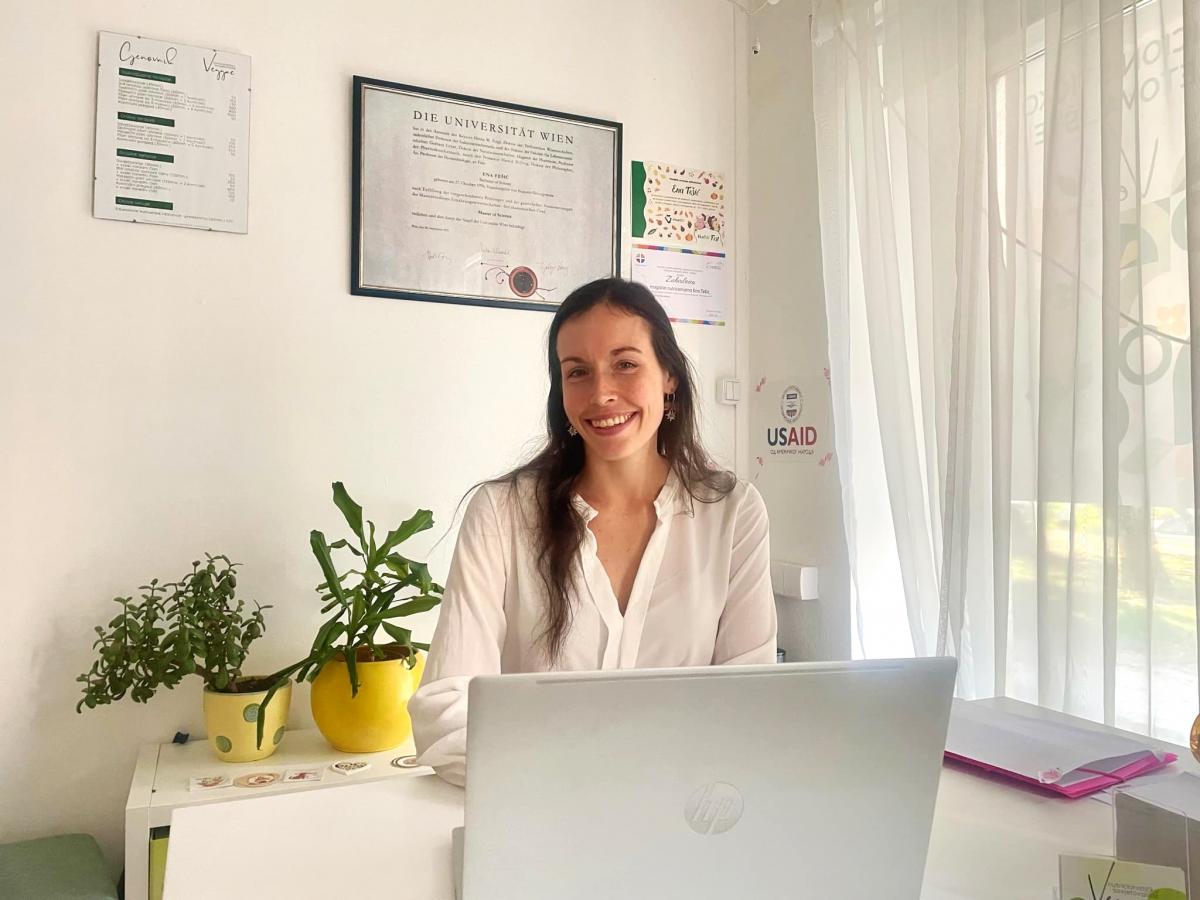
She says her biggest challenge was her first clients because it was her first time in the role of listening to others and being the one offering help to others, and charging for it. She quickly got over that fear, she says, and her most frequent clients are younger women who, with a balanced diet, want to achieve their desired, optimal weight.
Her consulting office is located in the city center, near the Museum of Republika Srpska. The financial support she received from the US Government and the City of Banja Luka was crucial in equipping the space and starting this business.
“Without that support, I probably wouldn’t have started the business now, I would have had to work harder to get there, and everything went quickly this way. With the funds I received, I paid my contributions, bought a laptop and the software needed to analyze body weight and calculate energy and nutritional values,” says Ena.
She is satisfied with her current business, and in the future she plans to hire one person to be in charge of marketing, which she believes would contribute to an increase in the number of clients.
Not far from the premises of Eni’s counseling center and near the Banja Luka City Administration building, there is the Banja Luka Entrepreneurship Center, where we spoke with four other women who started businesses as part of the USAID Human Rights Protection Support Program (USAID/INSPIRE).
Making jewelry and cosmetics as a successful business idea
Among them are two Draganas, both of whom make jewelry. Their jewelry is intended mainly for women, and they say that wearing good and unique jewelry makes women feel better. Through conversations, we get to know their work, and in this Entrepreneurial Center they show us some of their products.
Forty-one-year-old Dragana Mićić is the owner of the “TatArt” art workshop, where she makes jewelry and other handicrafts. The idea behind this business comes from her childhood, when she learned to knit and sew on a sewing machine from her grandmother and mother, while with her father, who was a technical education teacher, she made objects from wood and other materials. She started making jewelry, embroidery and other decorative items more actively in 2012, after the birth of her third child because she spent a lot of time at home.
“At that time, a lot of women started making fine jewelry , including me. It is polymer clay that is shaped like plasticine and then baked. But since I aspired to be different, I gradually added other materials and thus came to the copper wire, which suppressed all other materials”, says Dragana.
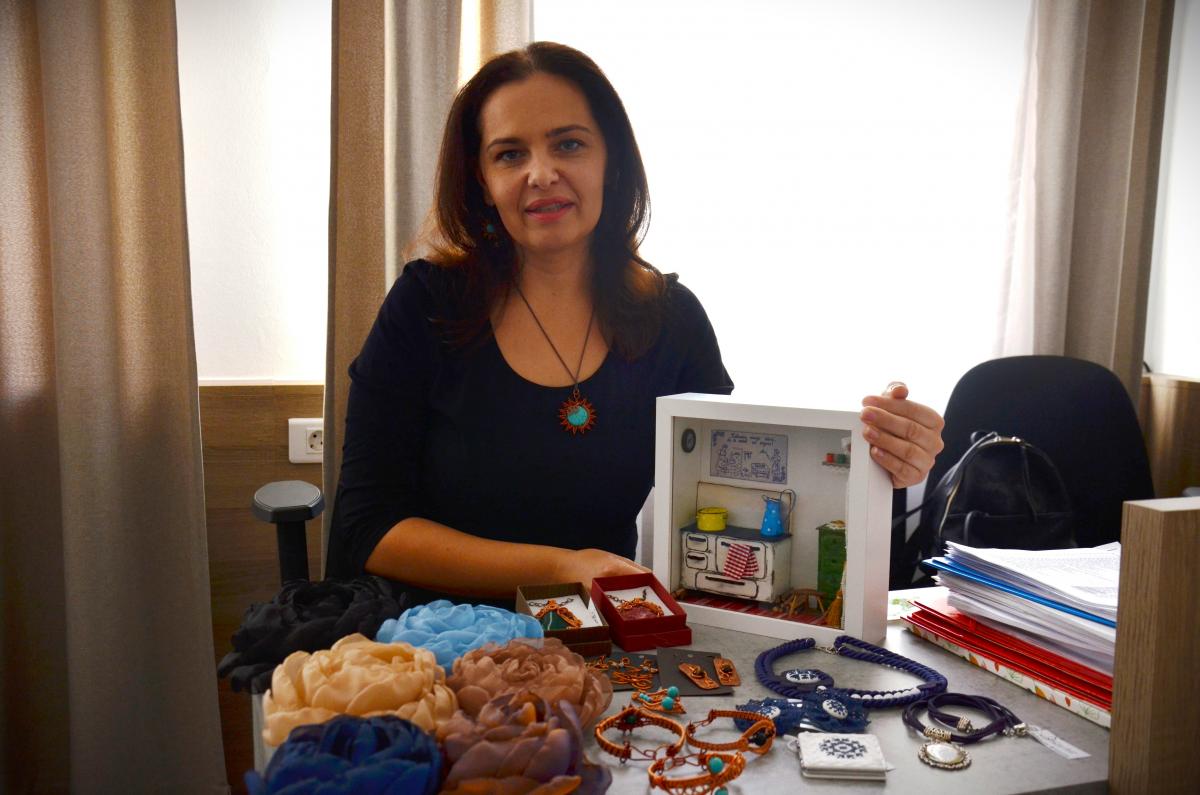
Over time, she began to combine copper with semi-precious stones, making earrings, rings, bracelets, necklaces and brooches. Dragana also makes embroidery for the decoration of which she uses a special technique – snake embroidery, which was practiced by women on Zmijanje, a plateau near Banja Luka, and which was included in the UNESCO list of cultural heritage in 2014.
The financial support she received from the US Government and the City of Banja Luka was, she says, the main driver for turning her hobby into a business. She has been doing well for nearly two years and is satisfied with her sales.
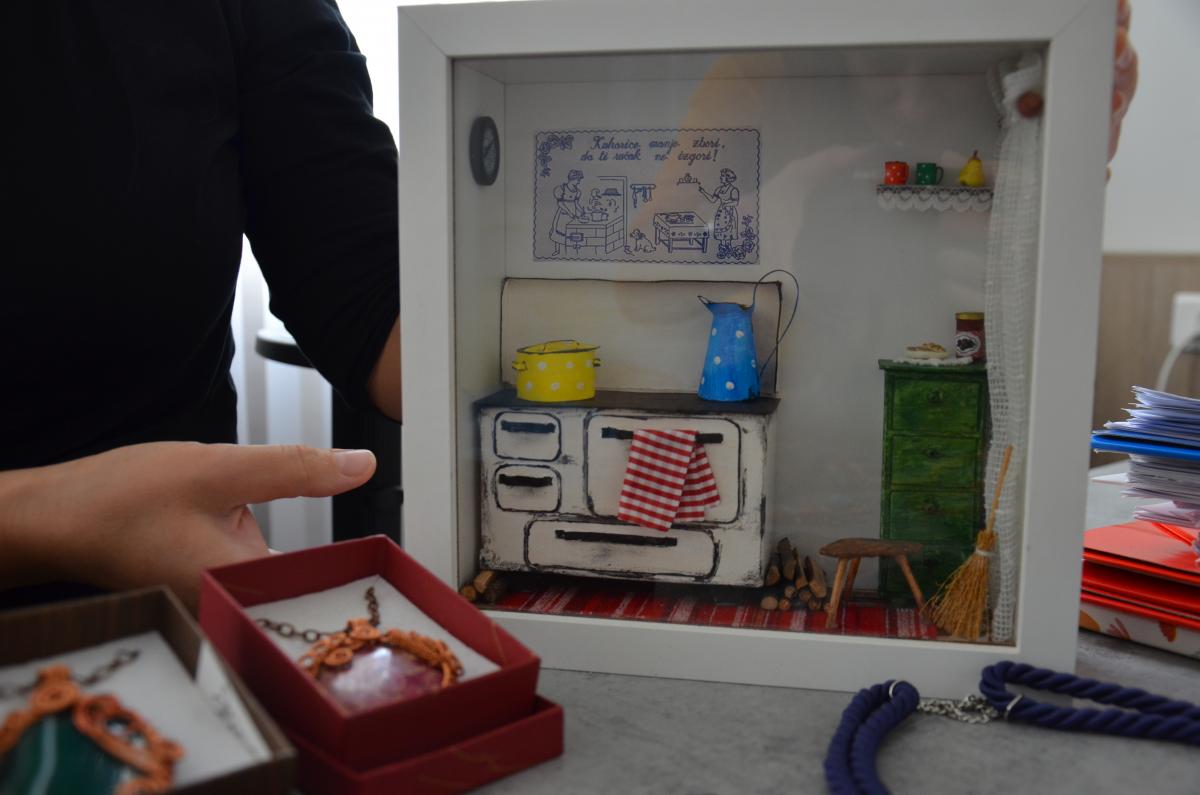
“I feel more useful, and therefore happier,” emphasizes Dragana.
Sixty-year-old Dragana Čorokalo has been making jewelry for more than a decade . Everything, as she says, started as a hobby, and the same support program was “the wind behind her to start something of her own”, even though she thought it was impossible. This program has helped her continue to do what she loves, without the stress of not being able to pay contributions, bookkeeper, and the like.
“I was relieved because I could pay my bills, and I also managed to buy a camera to improve my marketing,” she says.
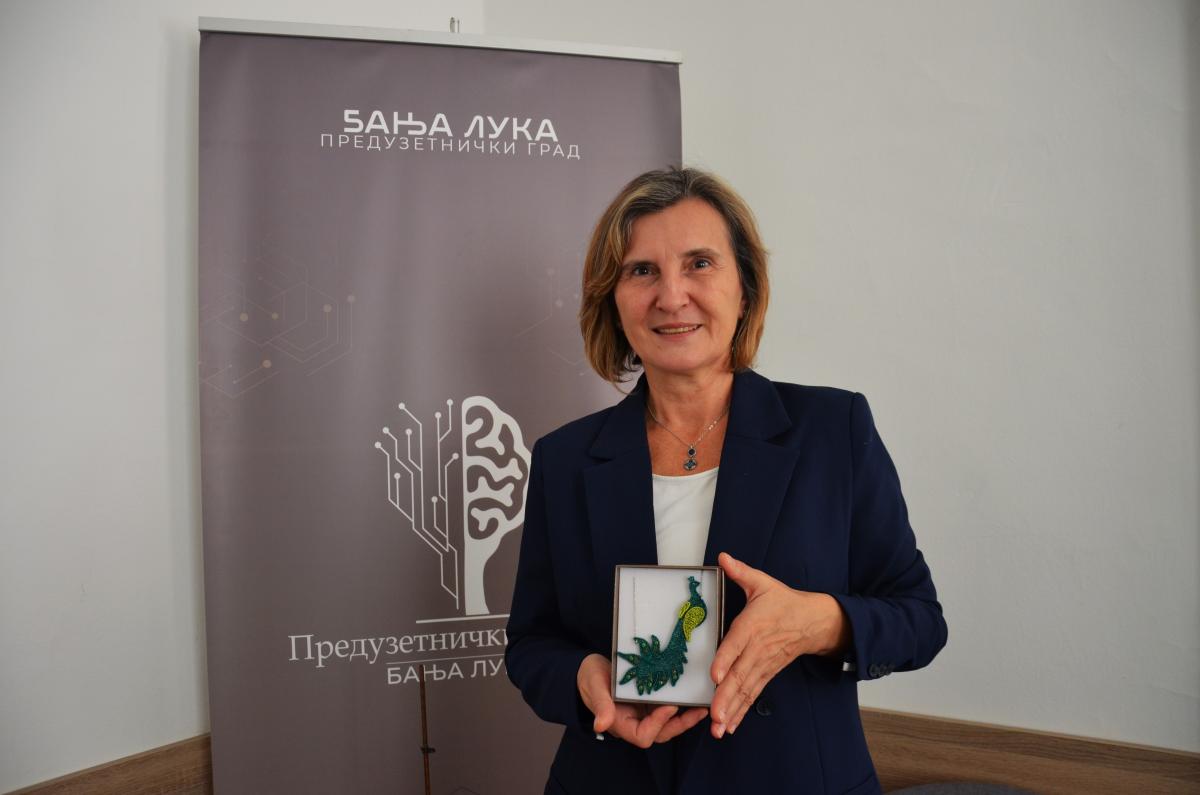
Her jewelry is created by crocheting wire, combined with beads and other accessories, and she often uses snake embroidery to decorate the jewelry.
“My jewelry is characterized by the fact that a lot of work has gone into it. It takes me a long time to make one piece of jewelry,” says Dragana.
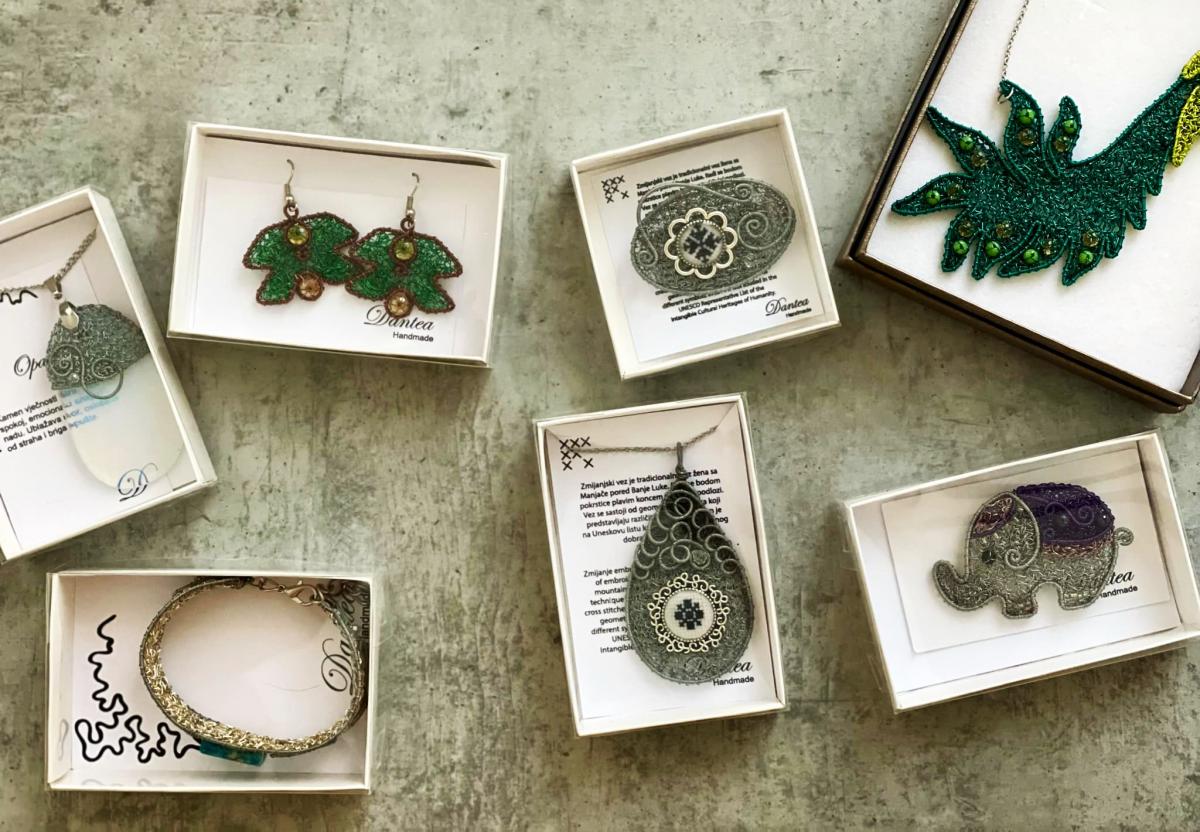
Since it is about bijouterie, she explains that she cannot expect a lot of profit, but that what she earns is quite enough for her.
Quality as the key to success
Jelena Klasan, a graduate in environmental ecology, started producing natural cosmetics in the desire to help her sister who has sensitive skin. After it turned out that her products were very effective, she left her current job and started a more serious production of cosmetics and founded the company “Herbalrefresh”.
“I was really tired of people being sold poisons and that people, when buying even the most expensive creams and cosmetics, did not get a quality product for that money. My wish was to market a quality organic substance that would allow people to achieve healthy-looking skin,” says Jelena.
Since she noticed that, as she says, there was no quality medicinal oil on our market, she also certified a medicinal herb farm such as immortelle, lavender, sage and rosemary for the production of natural cosmetics, so that her products would be even better quality. Some of the products she currently offers are creams for different skin types, serums, oils and tinctures.
“I combined science and plant molecules, and all my products were created based on scientific research. By growing medicinal herbs, I obtained high-quality plant raw materials thanks to which the skin itself recognizes the quality. In the end, a high-quality product was created and all our users are delighted,” Jelena points out.
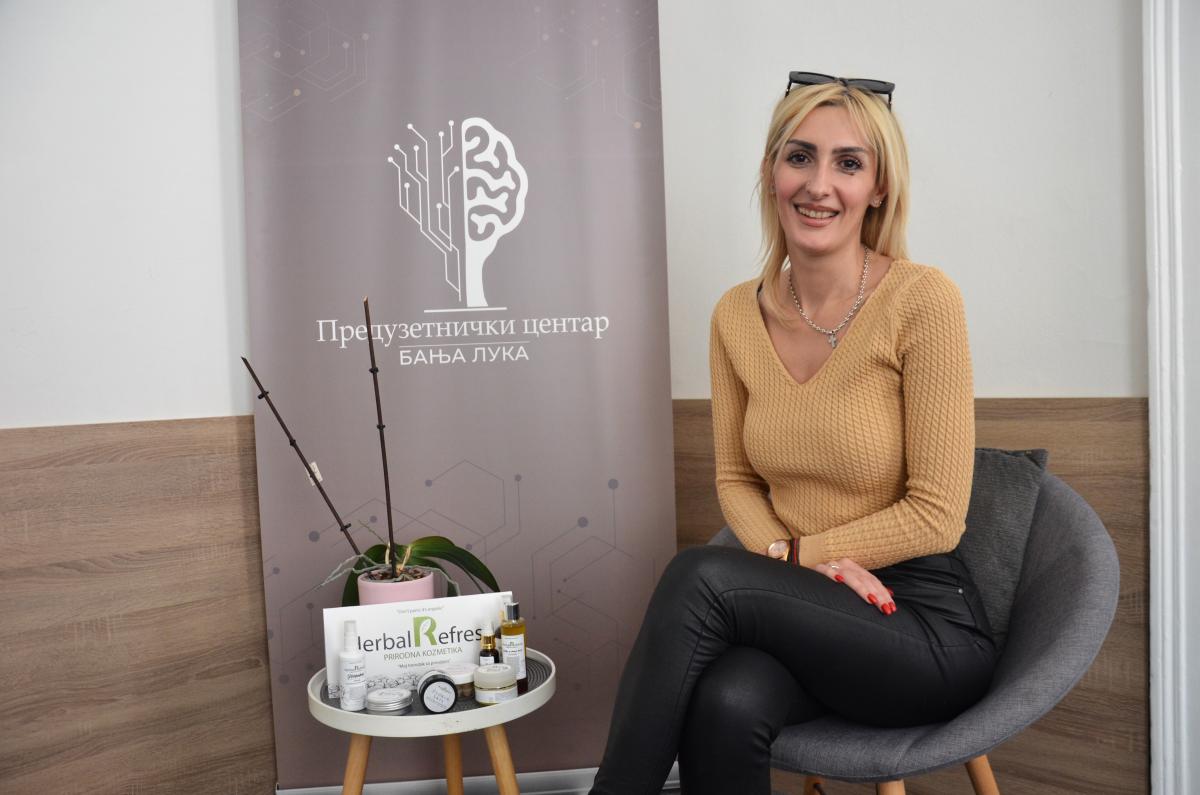
She adds that the production of natural cosmetics requires large financial investments, which is why she wanted to give up the business, but with the persuasion of a large number of customers, she continued to work. The financial support from the US Government and the City of Banja Luka was significant for her because, as she says, she did not have to think about whether she would be able to pay contributions, and she also used the funds received to create professional logo stickers and packaging. She emphasizes that good packaging was key to making her quality products look better, since usually “the packaging sells the product”.
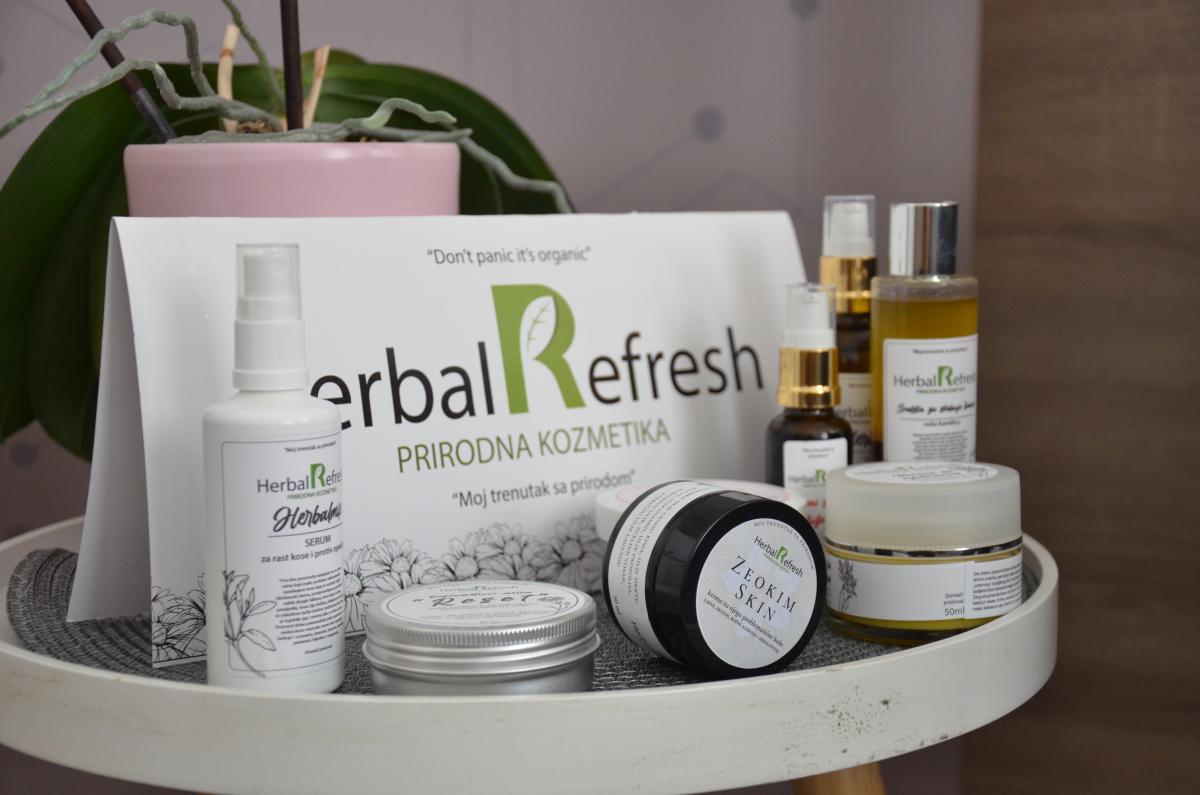
Psychological counseling center
In the premises of the Banja Luka Entrepreneurial Center, we also spoke with Nataša Pivašević, a graduate psychologist, transactional analysis counselor , and owner of the psychological counseling center “EGOGRAM”. She says that during her studies she volunteered on a counseling line for children, which helped her to focus on psychotherapy and counseling. She further gained experience by working in the non-governmental sector, at the Youth Center Zdravo da ste , where she worked as a counselor for children and youth.
“When I matured enough that only psychotherapy was done for me, that was the right moment to start my counseling center. My wish was to do psychotherapy and I felt that I had a sufficient base to start on my own”, says Nataša.
Thanks to the financial support she received through this program, she started her business almost two years ago, paid contributions during the first year of business, and bought a laptop that allows her to do online counseling. In addition to her, her partner is also employed at the counseling center, and together they offer individual counseling services, psychotherapeutic work, education, assertive communication, and emotional literacy workshops for groups.
The largest number of clients, he says, are women with a lack of self-confidence, and quite often they are also members of the LGBTI community who are looking for help related to driving or experienced violence.
To start any business, Nataša says that everyone needs to be empowered enough, get rid of any insecurities and fears, and move towards their goal. She believes that financial support is crucial for the realization of such goals, while financial stability can perhaps solve half of the problems a person faces.
“Especially if you are a woman who has experienced violence or is controlled in some way, because financial support will help that woman calm down, become stronger, and understand what she wants,” says Nataša.
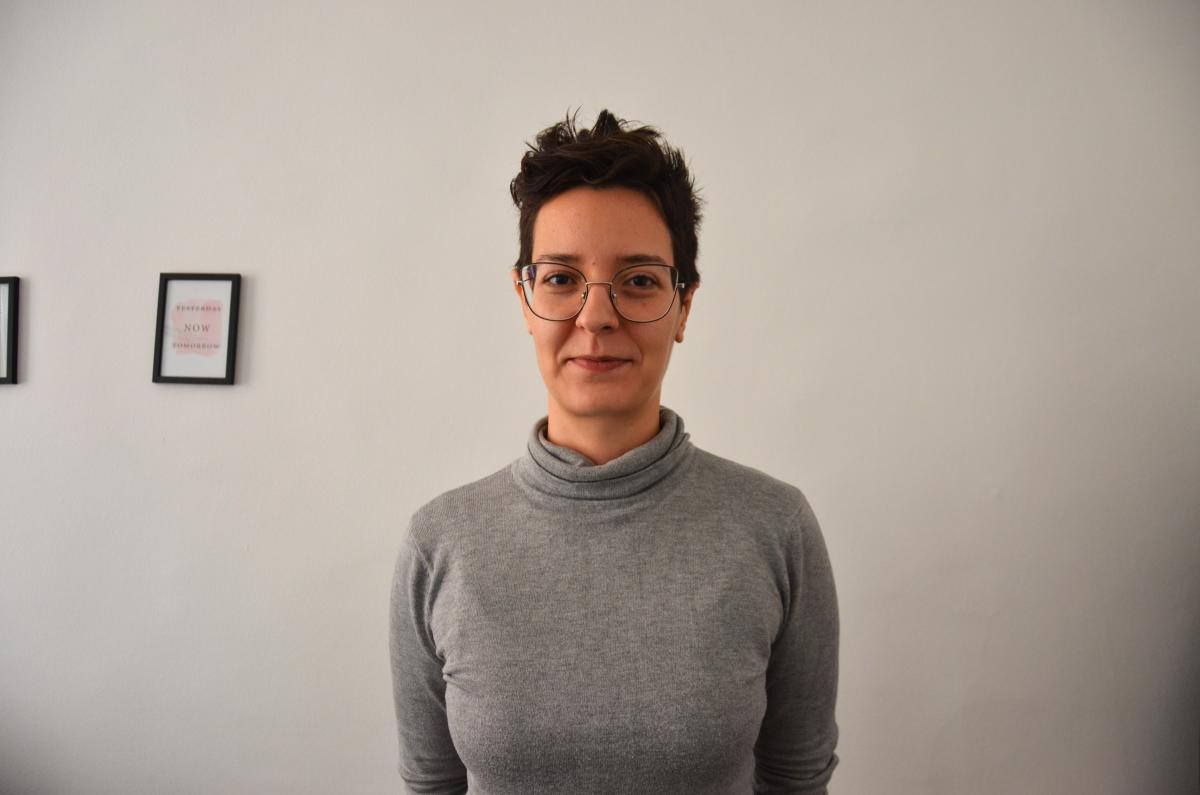
Not all businesses are sustainable
In addition to female entrepreneurs, we received more information about the importance of this program for Diskriminacija.ba from the Department of Economy and Local Economic Development of the Banja Luka City Administration. The cooperation agreement signed between the City of Banja Luka and the USAID/INSPIRE project began the implementation of activities in the area of supporting entrepreneurship of marginalized groups of women and creating special incentive programs for difficult-to-employ categories.
A Fund was established to support the development of businesses of marginalized groups of women, from which 17 women who met the necessary requirements and who underwent training in business plan development specifically designed for this target group were supported out of 35 entrepreneurs who applied. Given the large number of quality business plans, the Fund’s planned funds in the amount of 80,000 KM, 40 thousand KM each from the City budget and the US Government, were increased by an additional 56 thousand KM from the City budget, so that all 17 entrepreneurs would be supported in the amount of 8,000 KM each.
Although six entrepreneurs closed their businesses after the end of the one-year support, the Department of Economy and Local Economic Development says that there is a possibility for two entrepreneurs to restart their businesses. It will be important for them to be able to use the equipment purchased during the support period again.
In addition to the entrepreneurs we spoke with, Jelena Đurić Mastalo, Dragana Stanivuković, Radmila Lulić, Tamara Ćoćkalo, Tatjana Galić-Zetović, Marica Premasunac, Ljiljana Brkić, Sanja Jovicić, Maja Kos, Aleksandra Đurđević and Zorica Gvozdenović also started their businesses as part of this program.
The Department of Economy and Local Economic Development of the Banja Luka City Administration told us that, according to data from the Employment Agency of Republika Srpska, as of August 31 this year, 4,120 unemployed people were registered at the Banja Luka unemployment office, of which slightly more than half (2,190) were women. In addition to the aforementioned support program, the City of Banja Luka offers other subsidy programs every year for starting independent entrepreneurial activities, which are, among other things, intended for women.
Source: diskriminacija.ba





